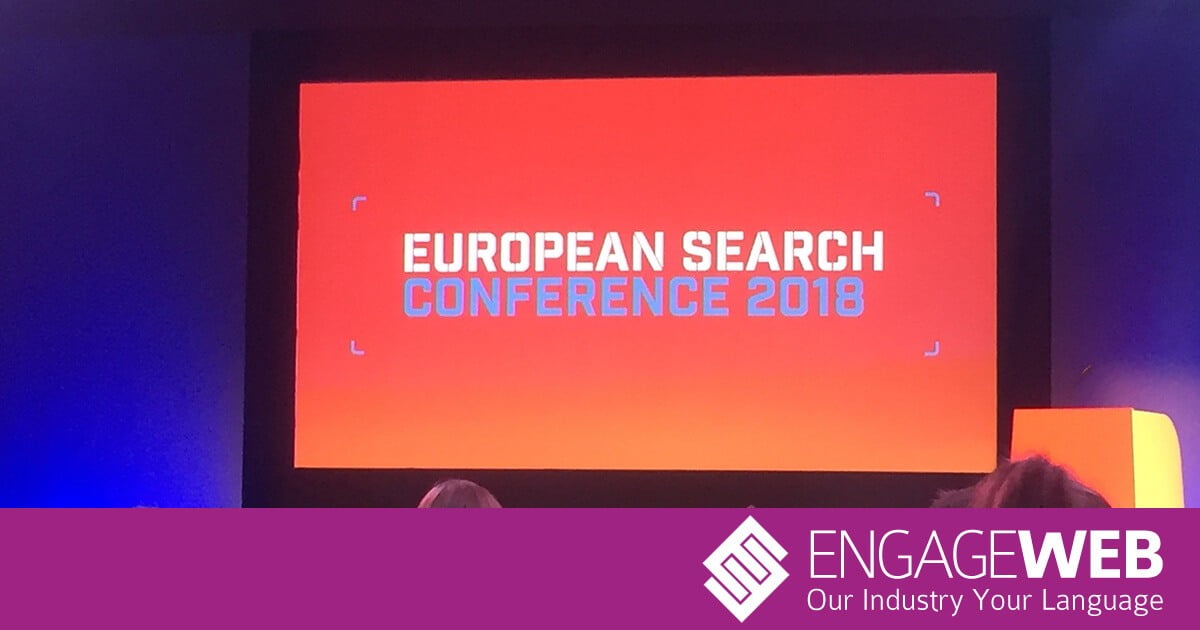Yesterday, some of us at Engage Web attended the European Search Conference 2018. Held at the Exhibition Centre Liverpool and forming part of the city’s International Business Festival, the event goes some way to replacing SAScon, which was held for the last time in Manchester last year.
The event was certainly well staged – probably more so than some recent SAScons have been. I thought in some ways it was trying a little too hard to be formal and corporate (the ‘business’ dress code was not adhered to by too many attendees) when SAScon’s beauty was its laidback and friendly nature, but talks were generally punchy and information packed. I certainly think 20-30 minutes is plenty of time for speakers, and encourages them to be concise and to the point, rather than gabble on about themselves too much.
Talks covered many of the topics we expected, including social media, web migration, algorithms and the much cherished GDPR. To my surprise though, it was a talk on the topic of voice search that probably piqued my attention the most.
Presented by Dawn Anderson from Manchester Metropolitan University (who ironically used her voice more than any other speaker in cramming absolutely tonnes of info into her timeslot), the talk covered some of the points SEOs and content developers should consider in light of predictions that by 2020, 30% of search will be voice conducted.
Anderson admitted, however, that there are two problems at present. One is that voice search is still at “day one” stage and is currently not very intuitive, with tools like Siri, Alexa, Google Home and Cortana still easily confused by pronouns and other nuances of conversation. The second is that outside of the SEO bubble, most people are not using them.
Here are my slides on Voice Search and Google Actions Assistant. So many opportunities ahead #EUSearchCon #eusearch
Consider all the steps your users takehttps://t.co/yF4oPUCMLk
— Dawn Anderson (@dawnieando) June 27, 2018
As you can see from slide 14 of her presentation, 74% of people are not using a voice assistant at all. To those who have embraced the likes of Siri, it might be hard to imagine life without it, but to assume this is the case for everybody is making a big mistake.
Myself, I will admit to being in the 74%. I use Siri occasionally and it’s very clever, but it seems like a gimmick that I don’t really see a practical use for. I find that by the time I’ve opened it up, waited for it to switch on and got it to understand my slightly mumbled, semi-Scouse accent, I could have searched for what I’m looking for myself.
Besides, speaking to a computer just seems a bit…weird. This is the reservation I have with voice search. As someone who considers himself to be on the periphery of the SEO bubble, can people like me (let alone those well outside of the bubble) ever be convinced that talking out loud to AI devices is an ordinary thing to do?
In a way I would liken it to video calling, which I would argue has not really taken off. Yes, I know Skype, FaceTime etc. are big successes, but the technology is there for normal audio-based, phone-to-ear calling to have disappeared by now. Today, there’s no reason why we shouldn’t be ringing up call centres and being greeted by the head and shoulders of a formally dressed customer representative appearing on our screens. If you phone up Tesco, why can’t you actually see a man or woman on your phone, wearing the Tesco uniform while in the aisles of the supermarket, visually welcoming your call?
Well, because people don’t want that. It feels awkward and unnatural. This is the biggest issue I feel technologies like voice search face – how do you convince everyday people that they shouldn’t feel embarrassed to publicly talk not only on their phone, but TO their phone as well?
Despite these reservations, I don’t dismiss voice search, and the fact that it is growing can’t be denied. From a content development point of view, perhaps the most significant takeaway is that people are now asking search engines ‘how’ more than any other question. This is a return to the very early days of internet search where people would search in the same way as they would ask a human being, but today’s search engines are much better at finding the answer, and content should be written in a way that helps Google and co. extract the relevant information.
- How to find a circular reference on Excel - May 23, 2024
- Five life skills learned from internet marketing - January 3, 2024
- How artificial intelligence can (and can’t) help you write content - September 29, 2023



